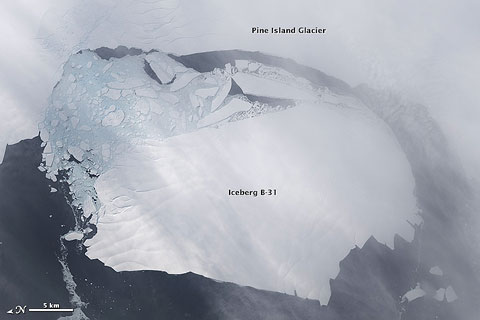Warsaw has seen a deluge of important climate-related information released — so much that it’s been difficult to keep up — but still not enough to steel negotiators to reach an equitable arrangement that gives us all a chance at a reasonable future climate. And at the same time, the planet has been sending signals that it’s not happy. The Pine Island glacier has finally calved the giant iceberg that first started to shown signs of cracking away from the ice stream a couple of years ago. Iceberg B-31 has been described as being the size of Singapore (about 700 km2), but isn’t likely to move far from Pine Island Bay in the near future. NASA Earth Observatory coverage here and here; see also Telegraph (UK) and Antarctic Sun.
The Global Carbon Project announced earlier this week that greenhouse gas emissions are projected to reach the highest level in human history this year — 36 billion tonnes. There are some encouraging signs that the rate of growth may be slowing, but nowhere near enough to enable the planet to avoid hitting a two degree rise in the first half of this century. There’s an excellent visualisation of national emissions at the Global Carbon Atlas (and at the Guardian). See also The Age, Think Progress. Continue reading “While they sleepwalk in Warsaw: icebergs calve, emissions climb, “pause” disappears”


 Something of a miscellany today, coupled with an open thread, to keep you going during a brief pause in posting. First up: a study published this week in PLOS Biology looks at changes in ocean chemistry, temperature and primary productivity over the next century under two emissions scenarios, and finds that no corner of the ocean escapes untouched. From
Something of a miscellany today, coupled with an open thread, to keep you going during a brief pause in posting. First up: a study published this week in PLOS Biology looks at changes in ocean chemistry, temperature and primary productivity over the next century under two emissions scenarios, and finds that no corner of the ocean escapes untouched. From  The Prime Minister’s
The Prime Minister’s